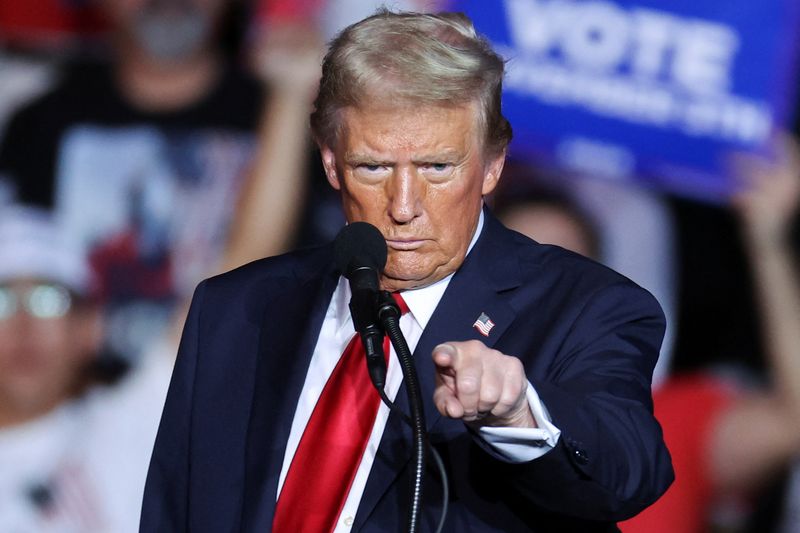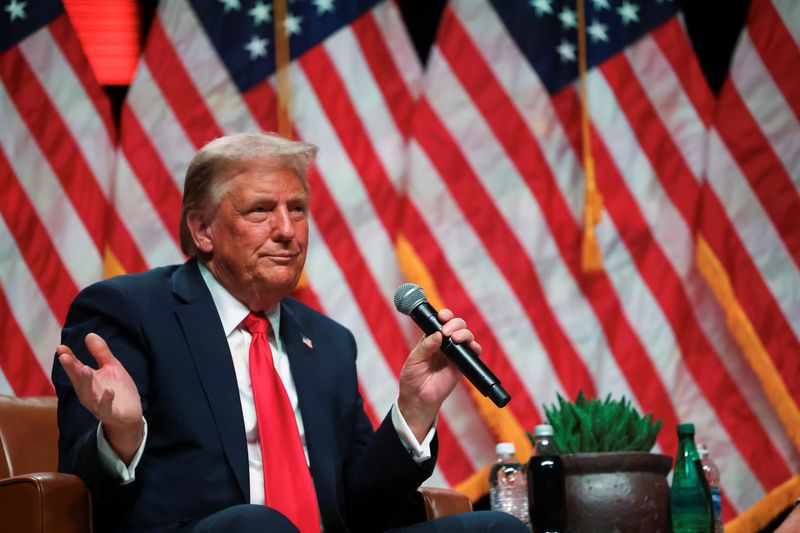By Samia Nakhoul and Parisa Hafezi
DUBAI (Reuters) - Iran’s leadership and allies are bracing for what they would regard as a dreadful outcome of the imminent U.S. presidential election: A return to power of Donald Trump.
Opinion polls suggest the Republican Trump and Democratic Vice President Kamala Harris remain locked in a close contest. But Iranian leaders and their regional allies in Lebanon, Iraq, and Yemen are concerned that Trump could well triumph on Nov. 5 and this could spell more trouble for them.
Iran's main concern is the potential for Trump to empower Israeli Prime Minister Benjamin Netanyahu to strike Iran's nuclear sites, conduct targeted assassinations and reimpose his "maximum pressure policy" through heightened sanctions on their oil industry, according to Iranian, Arab and Western officials.
They anticipate that Trump, who was president in 2017-21, will exert utmost pressure on Iranian Supreme Leader Ayatollah Ali Khamenei to cave in by accepting a nuclear containment deal on terms set by himself and Israel.
This potential change in U.S. leadership could have far-reaching implications for the Middle East balance of power, and might reshape Iran's foreign policy and economic prospects.
Analysts argue that whether the next U.S. administration is led by Harris or Trump, Iran will lack the leverage it once held - largely due to Israel's year-old military campaign aimed at degrading the Islamic Republic's armed proxies, including Hamas in Gaza and Hezbollah in Lebanon.
However, Trump's stance is perceived as more detrimental to Iran due to his more automatic support for Israel, they added.
"Trump will either put very tough conditions on Iran or let Israel carry out targeted strikes on its nuclear facilities. He is fully endorsing a military action against Iran," Abdelaziz al-Sagher, head of the Gulf Research Center think-tank, said.
"It's Netanyahu's dream day to have Trump back in the White House," he told Reuters.
POISON CHALICE?
A senior Iranian official who declined to be named told Reuters Tehran was "prepared for all scenarios. We have (for decades) consistently found ways to export oil, bypassing harsh U.S. sanctions..., and have strengthened our ties with the rest of the world no matter who was in the White House."
But another Iranian official said a Trump victory would be "a nightmare. He will raise pressure on Iran to please Israel..., make sure oil sanctions are fully enforced. If so, (our) establishment will be economically paralysed.”
In an election speech in October, Trump stated his unwillingness to go to war with Iran, but said Israel should "hit the Iranian nuclear first and worry about the rest later", in response to Iran's missile attack on Israel on Oct. 1.
Israel retaliated with airstrikes on Iranian military targets, especially missile production sites, on Oct. 26.
Iran's choices are limited going forward, analysts say.
“The reality is: Trump is going to support Netanyahu and give him the green light to do whatever he wants,” said Hassan Hassan, an author and researcher on Islamic groups. “Trump is much worse (than Harris) for Iran."
Hassan noted that Washington has delegated a substantial share of responsibility to Israel in the conflict with Iran and its proxies, with Israel leading the way. “The U.S. is involved enough in that it’s backing Israel, may be more so than before.
“This time it's just things are really bad for Iran. Iran is seen as a problem by both Republicans and Democrats.”
During her campaign, Harris called Iran a "dangerous" and "destabilising" force in the Middle East and said the U.S. was committed to Israel's security. She said the U.S. would work with allies to disrupt Iran's "aggressive behaviour".
But Trump's re-election would be a "poisoned chalice", for Khamenei, according to two regional officials.
If he were to reinstate stringent sanctions, Khamenei may be forced to negotiate and accept a nuclear pact more favourable to U.S. and Israeli term to preserve theocratic rule in Iran, which is facing growing foreign pressure and has been buffeted by bouts of mass protest at home in recent years.
A U.S.-Saudi defence pact tied to Riyadh's establishing diplomatic relations with Israel, now in its final negotiating stages, poses a significant challenge to Khamenei too.
This alliance threatens to shift the regional balance of power by creating a more unified front against Iran, impacting its geopolitical standing and strategy in the Middle East.
NEW ARCHITECTURE
Hassan said recent attacks on Iran and its allies have been widely perceived as a significant success for Israel. They offered insights into what a limited strike on Iran might look like, setting a precedent and altering assumptions that military action on Iran would inevitably spark a wider Middle East war.
A senior Arab security official said that Tehran could "no longer brandish its influence through its armed proxies" in the wake of Israel's deadly strikes on Hezbollah and Hamas leaders.
For its own part, Iran has every reason to fear another Trump term.
It was Trump who in 2018 unilaterally pulled the U.S. out of Iran’s 2015 nuclear deal with world powers and ordered the killing of Qassem Soleimani, Khamenei's right-hand man and mastermind of overseas attacks on U.S. and allied interests.
Trump also imposed punitive sanctions targeting Iran’s oil export revenues and international banking transactions, which led to extreme economic hardship and exacerbated public discontent in the Islamic Republic.
He frequently said during his presidential campaign that President Joe Biden's policy of not rigorously enforcing oil export sanctions has weakened Washington and emboldened Tehran, allowing it to sell oil, accumulate cash and expand its nuclear pursuits and influence through armed militias.
In March, he told Israel's Hayom newspaper in an interview that Iran could have a nuclear weapon in 35 days and that Israel - which deems Iran's nuclear activity an existential threat though is widely thought to have the region's only nuclear arms - was in a "very treacherous and dangerous neighbourhood".
An Arab government adviser noted that Tehran recognises there is a "new architecture in the making", but also that Trump despite his tough rhetoric realises there is no alternative to a deal with Iran given its accelerated uranium enrichment program.
"Trump might aim for a new nuclear agreement, he could say I tore up the 2015 agreement because it was incomplete and replace it with a long-lasting agreement, touting it to 'make America great again' and preserve U.S. interests," the adviser said.
As the 2015 deal has eroded over the years, Iran has escalated the level of fissile purity in enriched uranium, cutting the time it would need to build an atom bomb if it chose to, though it denies wanting to.
Iran Online, a state-run news website, stated that when Trump left office, Iran was capping enrichment at 3.67 percent under the deal, far below the 90 percent of weapons grade.
Now, Iran has "enriched uranium to 60% with IR-6 advanced centrifuges" and could achieve nuclear weapons capability "within a few weeks ... Completing the nuclear deterrence cycle is Iran's greatest trump card against Trump," it said.

Arab and Western officials warn that the more Iran hints it is nearing development of an atom bomb, the more they incite the need for Israel to strike.
"If Trump reassumes power, he will support Israeli plans to strike Iranian nuclear facilities,” a Western official said.
